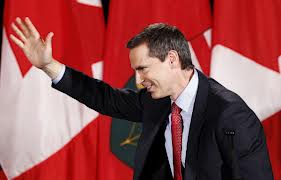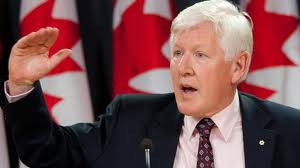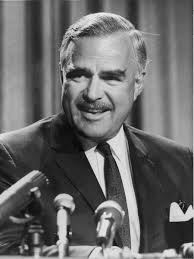February 18, 2014
BURLINGTON, ON.
“The single most important thing the government can do to secure Ontario’s prosperity is to eliminate the deficit.” This statement appears at least three times in the 2013 budget document, as if to leave no uncertainty that Ontario’s ballooning debt is front and center of all policy. That debt now has risen to match that of the federal government as a percentage of gross domestic product (GDP) – approaching 40 percent.
I grew up observing John Robarts, nicknamed ‘the Chairman of the Board’ for his commanding leadership of Ontario. He presided over unprecedented economic development, with up to 8% growth rates during the 1960’s. He gave us our single-payer health insurance, modernized the public service, introduced bilingualism and education reform and was known for his balanced budgets.
His successor, Bill Davis, on the other hand, governed the province form 1971 to 1985 but never once balanced a budget. David Peterson eked out a small surplus in his last year in office and we all know that Bob Rae’s NDP never even came close. For all his big talk, Mike (the knife) Harris managed only four balanced budgets before quitting politics, leaving his next inevitable deficit for Ernie Eves to announce. Then Dalton McGuinty’s Liberals registered three balanced budgets in a row during their first eight years in office.
In fact, if we add up the budgetary performance of all governments over the last forty-two years ago, going back to when Bill Davis became Premier, we’d find that the Liberals and Progressive Conservatives delivered exactly the same number of balanced budgets – four a piece. And, the Tories held power for five more years than the Liberals over that time frame. Thus, this myth that Conservatives are somehow better at managing the deficit is pure and utter rubbish. This is also true for the federal political parties.
John Robarts benefited from a truly progressive income tax system where the wealthy paid their fair share, and the middle class prospered. Mike Harris, by contrast, made huge cuts in income taxes and paid for them by slashing public programs – primarily welfare, health care, education and municipal services. Given the magnitude of Harris’ austerity program, he should have been able to balance all of his budgets, had he just not cut income taxes as he did. As the current federal finance minister is fond of saying – there is no free lunch.

Dalton McGuinty balanced some budgets – but budgets weren’t his downfall – the gas plant fiasco did him in.
McGuinty raised taxes modestly on coming to office, introducing the Health (insurance) Premium. But then he further cut corporate and personal taxes, ironically, at a time when the economy most needed more tax revenue to deal with the consequences of the 2008 global meltdown. As a result the provincial debt which has nearly doubled since 2004 is now a priority for Premier Wynne.

Bob Rae couldn’t catch a break anywhere and had the misfortune of getting hit by an economy no one was able to manage. The lack of any experience running a government didn’t help.
Balancing a budget requires tough choices, compromise and determination. Bill Davis had the good fortune to inherit a well-run and funded government, yet failed to keep his expenses in balance over his fourteen year run. Mike Harris squandered the benefits of his austerity measures and Bob Rae, stuck with Ontario’s worst recession since the nineteen-thirties, couldn’t get a break.
McGuinty inherited Harris’ tax regime yet still pulled out three surpluses, even as Ontario became a have-not province in the federation. Unlike Harris, however, he actually expanded the effectiveness of public service. Health care waiting times fell from being the longest in Canada to the shortest; high school graduation rates jumped from 68% (2003) to 83% (2011) ; school test scores rose to among the highest in the country; and poverty levels dropped.
High public debt limits the ability of a government to respond to circumstances, such as the economic collapses in 1990 or 2008, with the wherewithal to effect a swift recovery. And paying interest on that debt is money which cannot be used for some other economic purpose. John Robarts followed the Keynesian economic model, which asserts that debt be paid down in good economic times – but Keynes became a pariah in the eighties. So today both Ontario and the federal government are running debt levels at over a third of our GDP – levels which are high, if not dangerously high for the eventual rise in interest rates.

Mike Harris balanced some of his budgets – but was known more for the significant damage done to the province’s education system and reducing the wrong taxes for the wrong reasons.
To address this, Ontario could go back to the austerity of the ‘Mike the knife’ days, closing hospitals and laying off nurses; increasing class room sizes and laying off teachers; selling off crown corporations and assets; and deferring essential infrastructure like bridges, highways and public transit. We recall stories of classroom wars, cardiac patients dying in hospital hallways awaiting critical surgery, and tires flying off trucks on our highways during the good old Harris days.
Alternatively we could just let the debt continue to rise until it becomes difficult and costly to borrow any more, blindly mimicking what we witnessed with the Greek economy last year. Or, we could go back to paying our way as we go. We could bring back the kinds of taxation policies which would grow the middle class – the ones which enabled John Robarts to fund Ontario’s high growth in the sixties, without the need to run up deficits and the debt.
 Ray Rivers writes weekly on both federal and provincial politics, applying his more than 25 years as a federal bureaucrat to his thinking. Rivers was a candidate for provincial office in Burlington where he ran against Cam Jackson in 1995, the year Mike Harris and the Common Sense Revolution swept the province. He developed the current policy process for the Ontario Liberal Party.
Ray Rivers writes weekly on both federal and provincial politics, applying his more than 25 years as a federal bureaucrat to his thinking. Rivers was a candidate for provincial office in Burlington where he ran against Cam Jackson in 1995, the year Mike Harris and the Common Sense Revolution swept the province. He developed the current policy process for the Ontario Liberal Party.
Background links:
2013 Ontario Budget John Robarts Bill Davis McGuinty and Harris Education in Ontario
Finance Minister’s Address Ontario’s Fiscal History Public Debt Canadian Public Debt



















Not sure about the point of this story, or if it even has one. The 1960s were not the 1970s, just as the 1970s were not the 1980s, etc., etc. Different governments faced different problems regarding economic growth or contraction and did what they thought was right at the time to deal with them.
I agree with Tony, there is little point in employing inflammatory language like “Mike the Knife”, and his point about Paul Martin offloading costs onto the provinces is well taken when one considers the Harris government’s attempts to deal with that reality.
The only thing that matters now, since we appear to be heading to a provincial election in a few months, is what these people at Queen’s Park intend to do to fix the “elephant in the room” — the provincial deficit. We know who got us there. What we want to know is who is going to get us out of it and how.
While we are on the topic of “political spin” and “working with the facts”…
Ray Says:
“Mike Harris, by contrast, made huge cuts in income taxes and paid for them by slashing public programs – primarily welfare, health care, education and municipal services.”
The Ontario Ministry of Finance’s website says:
“Mike Harris won power after running on a platform called the “Common Sense Revolution” (CSR). The platform set out four key objectives: tax reduction, balancing the budget, reducing the size of government, and greater emphasis on individual economic responsibility. The new government substantially implemented its platform. With the exception of health care, spending was reined in;”.
Why the difference in the factual representation of health care spending? Ray – “huge cuts”, slashing” to health care. OMofF – “with the exception of health care, spending was reigned in”.
Some other notable exerpts from the Ontario Ministry of Finance Website:
-This one in reference to Provincial deficit cutting in the 1990’s, “Four provinces that also engaged in vigorous deficit-cutting exercises are of special interest to us — Alberta, Saskatchewan, New Brunswick and (of greatest relevance) Ontario. “In spite of their different situations as well as approaches, all of these governments were successful in their efforts,” one study concluded. A thread common to all of these was their reliance on spending restraint or outright cuts to a much greater extent than tax increases.”
-“Although the Harris government retains its reputation as one that made deep and lasting spending cuts, the reality is rather different. From its 1995–96 peak, program spending fell by only 4.1 per cent and stayed below the peak for only three years. By comparison with Alberta and Saskatchewan, Ontario’s restraint was both milder and much shorter. Even Quebec cut program spending by more than Ontario during this period — 4.6 per cent in the two years from 1994–95 to 1996–97.
Holding program spending in check is never easy, especially not when governments face constant pressure to increase spending. Inflation, population growth, compensation demands and sheer need all push governments in the direction of higher spending, as do vocal interest groups that advance any number of causes, many of them worthy. Since the current government faces some of the same issues as the Harris government, Ontario’s experience in the 1990s merits closer examination.”
Mike Harris is often demonized by his opponents with such wording as “slashing”, “budget cuts”. Ray calls him “Mike the Knife”. Usually opponents omit one main fact – the Federal Government at the time cut transfer payments by $30b.
The dynamics and demographics are significantly different between 1960’s and today. Ray Rivers finishes by suggesting here that we can pay as we go through taxation policy. The Ontario Department of Finance appears to have a somewhat contrasting stance. Good, bad, Tories, Liberals, spin, facts, opinion – not sure I’m any further ahead here.
I have included a link to the site which I have referenced for those who are interested. https://www.fin.gov.on.ca/en/reformcommission/chapters/ch2.html
Hi Tony and thanks for referring another information source. It is true that hospitals were closed and nurses laid off, and that wait times significantly increased during Harris’ time in office. As you may recall we were sending cancer patients to the US for radiation. That should have, but that may not have, all translated directly into budgetary savings. That it didn’t is troubling.
Thanks
Ray
You are one crazy Liberal addict. Time to let go of your fantasies of Liberal goodness of the sixties, let go.
The current Liberal regime is on course for destroying this province. Wynne is scaring away industry and economic development interests by choking people with more taxes and increasing deficit spending and eroding public confidence in government leadership.
People with your mindset, who enjoy the luxury of guaranteed pension income from your days as a civil servant, are going to kill the same world that gave you your comfort quality of life.
You cannot run deficits in exchange for comfy Liberal ideals.
Time for Harris Part II.
You cannot compare the economic condition of the sixties versus today. The 60’s were fueled by the effects of the second world war, and everybody had a pretty good ride on the baby boom generation.
Keynes and politics will never dovetail in sync because of two parties; Liberals and NDP who both love to engage in spend partying at the first sight of spare cash.
The problem with Harris was that he was too soft; his greatest mistake was not cutting enough, and now we are paying for it, for Rae, for McGuinty. Wynne has no credibility, and it will be nice to get her off the stage hopefully by this June.
Economics is relatively simple; no deficits, period. And less government, obviously.
Interesting that for all the praise you give John Robarts as a premier and a budget-balancer, you don’t include his ten years in your overall history of balanced budgets and party leadership. Seems kind of disingenuous to selectively pick the period of 42 years ago for comparisons, when you could have picked 52 years ago and included Robart’s record. But then that wouldn’t have supported the main point you were trying to make, would it?
Gary, Thanks for commenting but don’t you think 42 years is long enough? The second person commenting thought it would be too long to include information from the ’60.
Ray
We could go back to the stone age if that helps us to move forward.
Ray, you brought John Robarts and his record into your story in quite a few descriptive and complimentary sentences, but then didn’t include his record in your time period. Sure 42 years is a long time, but 52 is even longer and may be more representative. In historical analysis, a longer time period is usually better than a shorter one when making judgements. Take it back to Confederation if you’d like.
There is no magic time period, but you brought Mr. Robarts into the discussion, not me. I just pointed the inconsistency out.
For those singing in the Mike Harris, Rob Ford, Jim Flaherty, Tim Hudak and Stevie Harper choir it must seem like the score is off-key when you remember that John Robarts was able to balance budgets by introducing the Provincial Sales Tax (raising taxes) instead of enacting service cuts that resemble self-mutilation.
As the business war-lords have been given generous tax reductions by both Federal and Provincial parties in power and refused to lead economic growth, then it becomes the government’s responsibility. The first appropriate tax action now is the retrenchment of those generous tax reductions.